International Conference on Sustainable Tourism: Unit 32 Report
VerifiedAdded on 2023/01/11
|9
|2411
|29
Report
AI Summary
This report examines sustainable and responsible tourism management, covering the evolution of the concept, the roles of global tourism organizations, and the importance of tourism development planning. It delves into the economic, social, cultural, and environmental impacts of tourism, and evaluates how principles of sustainability are implemented by businesses to meet stakeholder expectations. The report assesses sustainable tourism management across international, national, regional, and local scales, providing a comprehensive overview of the subject. It also includes a scenario where the student is working for a major tour operator and has been asked to attend an International Conference on Sustainable Tourism.
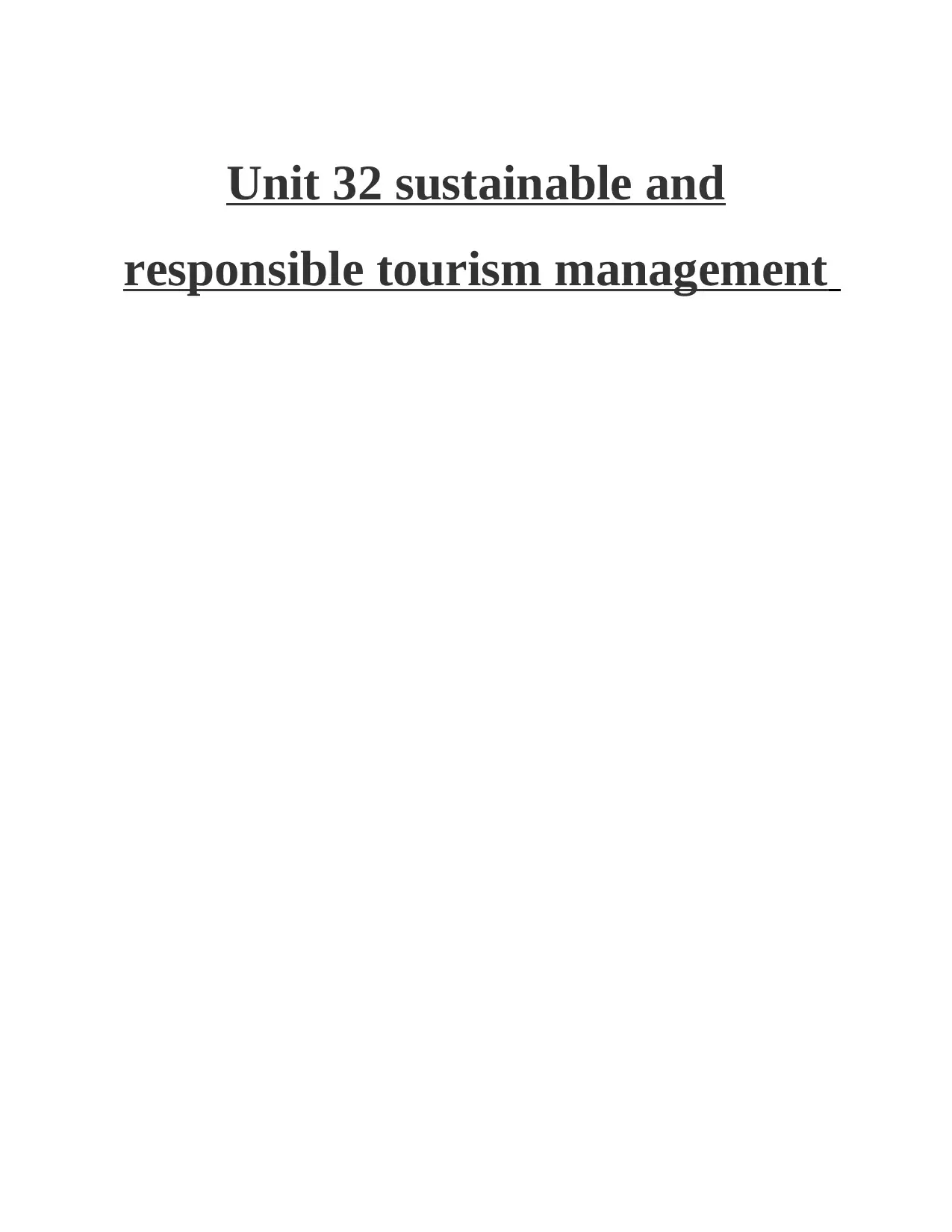
Unit 32 sustainable and
responsible tourism management
responsible tourism management
Paraphrase This Document
Need a fresh take? Get an instant paraphrase of this document with our AI Paraphraser
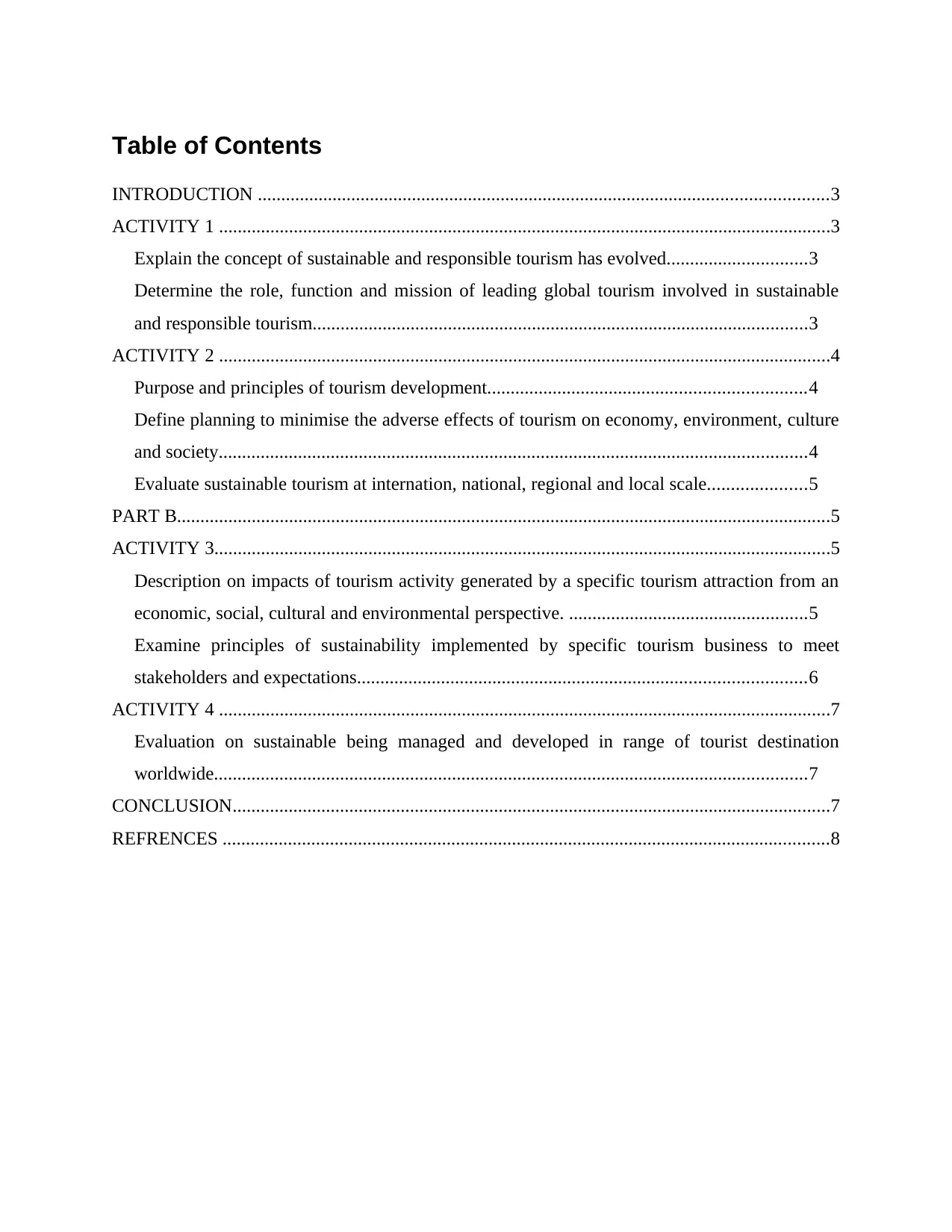
Table of Contents
INTRODUCTION ..........................................................................................................................3
ACTIVITY 1 ...................................................................................................................................3
Explain the concept of sustainable and responsible tourism has evolved..............................3
Determine the role, function and mission of leading global tourism involved in sustainable
and responsible tourism..........................................................................................................3
ACTIVITY 2 ...................................................................................................................................4
Purpose and principles of tourism development....................................................................4
Define planning to minimise the adverse effects of tourism on economy, environment, culture
and society..............................................................................................................................4
Evaluate sustainable tourism at internation, national, regional and local scale.....................5
PART B............................................................................................................................................5
ACTIVITY 3....................................................................................................................................5
Description on impacts of tourism activity generated by a specific tourism attraction from an
economic, social, cultural and environmental perspective. ...................................................5
Examine principles of sustainability implemented by specific tourism business to meet
stakeholders and expectations................................................................................................6
ACTIVITY 4 ...................................................................................................................................7
Evaluation on sustainable being managed and developed in range of tourist destination
worldwide...............................................................................................................................7
CONCLUSION................................................................................................................................7
REFRENCES ..................................................................................................................................8
INTRODUCTION ..........................................................................................................................3
ACTIVITY 1 ...................................................................................................................................3
Explain the concept of sustainable and responsible tourism has evolved..............................3
Determine the role, function and mission of leading global tourism involved in sustainable
and responsible tourism..........................................................................................................3
ACTIVITY 2 ...................................................................................................................................4
Purpose and principles of tourism development....................................................................4
Define planning to minimise the adverse effects of tourism on economy, environment, culture
and society..............................................................................................................................4
Evaluate sustainable tourism at internation, national, regional and local scale.....................5
PART B............................................................................................................................................5
ACTIVITY 3....................................................................................................................................5
Description on impacts of tourism activity generated by a specific tourism attraction from an
economic, social, cultural and environmental perspective. ...................................................5
Examine principles of sustainability implemented by specific tourism business to meet
stakeholders and expectations................................................................................................6
ACTIVITY 4 ...................................................................................................................................7
Evaluation on sustainable being managed and developed in range of tourist destination
worldwide...............................................................................................................................7
CONCLUSION................................................................................................................................7
REFRENCES ..................................................................................................................................8
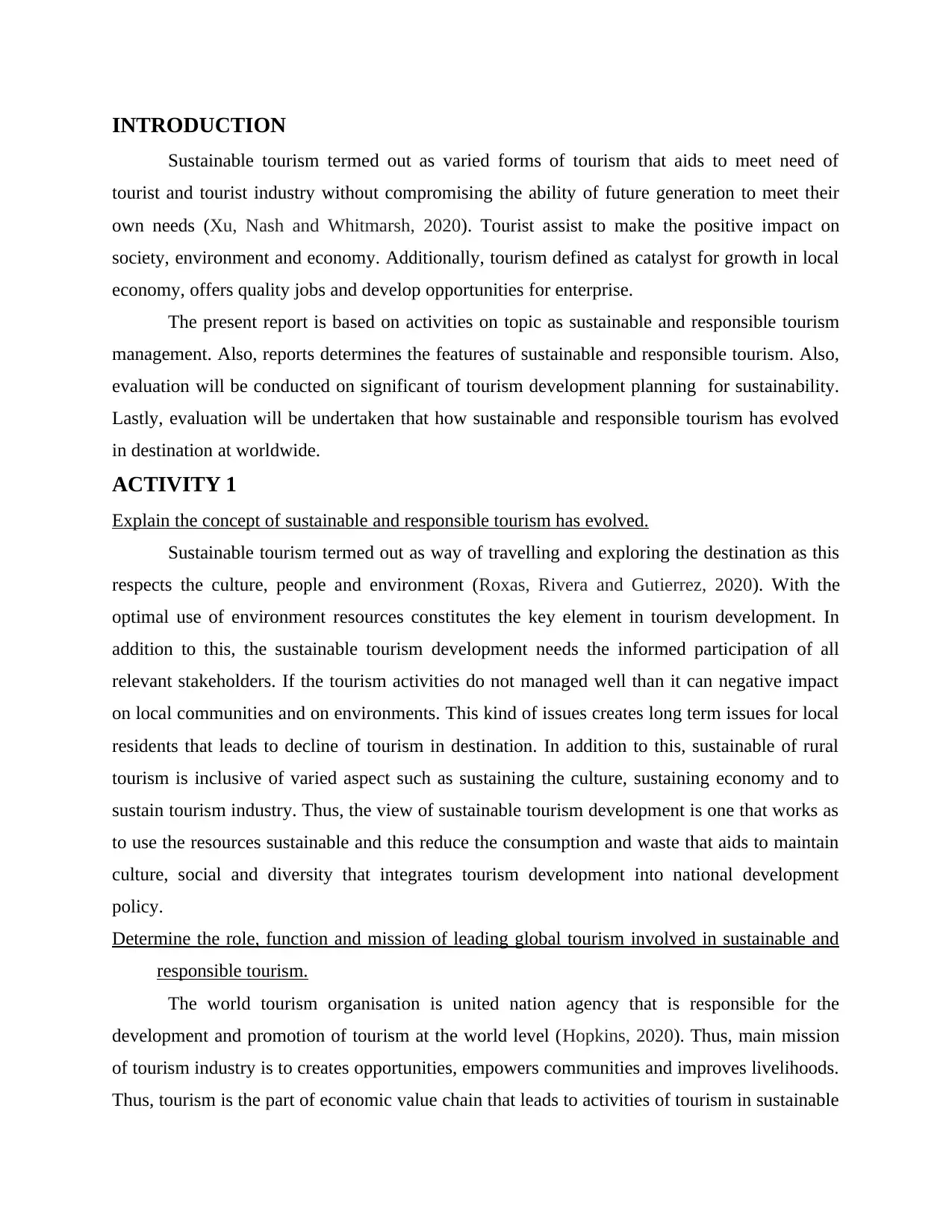
INTRODUCTION
Sustainable tourism termed out as varied forms of tourism that aids to meet need of
tourist and tourist industry without compromising the ability of future generation to meet their
own needs (Xu, Nash and Whitmarsh, 2020). Tourist assist to make the positive impact on
society, environment and economy. Additionally, tourism defined as catalyst for growth in local
economy, offers quality jobs and develop opportunities for enterprise.
The present report is based on activities on topic as sustainable and responsible tourism
management. Also, reports determines the features of sustainable and responsible tourism. Also,
evaluation will be conducted on significant of tourism development planning for sustainability.
Lastly, evaluation will be undertaken that how sustainable and responsible tourism has evolved
in destination at worldwide.
ACTIVITY 1
Explain the concept of sustainable and responsible tourism has evolved.
Sustainable tourism termed out as way of travelling and exploring the destination as this
respects the culture, people and environment (Roxas, Rivera and Gutierrez, 2020). With the
optimal use of environment resources constitutes the key element in tourism development. In
addition to this, the sustainable tourism development needs the informed participation of all
relevant stakeholders. If the tourism activities do not managed well than it can negative impact
on local communities and on environments. This kind of issues creates long term issues for local
residents that leads to decline of tourism in destination. In addition to this, sustainable of rural
tourism is inclusive of varied aspect such as sustaining the culture, sustaining economy and to
sustain tourism industry. Thus, the view of sustainable tourism development is one that works as
to use the resources sustainable and this reduce the consumption and waste that aids to maintain
culture, social and diversity that integrates tourism development into national development
policy.
Determine the role, function and mission of leading global tourism involved in sustainable and
responsible tourism.
The world tourism organisation is united nation agency that is responsible for the
development and promotion of tourism at the world level (Hopkins, 2020). Thus, main mission
of tourism industry is to creates opportunities, empowers communities and improves livelihoods.
Thus, tourism is the part of economic value chain that leads to activities of tourism in sustainable
Sustainable tourism termed out as varied forms of tourism that aids to meet need of
tourist and tourist industry without compromising the ability of future generation to meet their
own needs (Xu, Nash and Whitmarsh, 2020). Tourist assist to make the positive impact on
society, environment and economy. Additionally, tourism defined as catalyst for growth in local
economy, offers quality jobs and develop opportunities for enterprise.
The present report is based on activities on topic as sustainable and responsible tourism
management. Also, reports determines the features of sustainable and responsible tourism. Also,
evaluation will be conducted on significant of tourism development planning for sustainability.
Lastly, evaluation will be undertaken that how sustainable and responsible tourism has evolved
in destination at worldwide.
ACTIVITY 1
Explain the concept of sustainable and responsible tourism has evolved.
Sustainable tourism termed out as way of travelling and exploring the destination as this
respects the culture, people and environment (Roxas, Rivera and Gutierrez, 2020). With the
optimal use of environment resources constitutes the key element in tourism development. In
addition to this, the sustainable tourism development needs the informed participation of all
relevant stakeholders. If the tourism activities do not managed well than it can negative impact
on local communities and on environments. This kind of issues creates long term issues for local
residents that leads to decline of tourism in destination. In addition to this, sustainable of rural
tourism is inclusive of varied aspect such as sustaining the culture, sustaining economy and to
sustain tourism industry. Thus, the view of sustainable tourism development is one that works as
to use the resources sustainable and this reduce the consumption and waste that aids to maintain
culture, social and diversity that integrates tourism development into national development
policy.
Determine the role, function and mission of leading global tourism involved in sustainable and
responsible tourism.
The world tourism organisation is united nation agency that is responsible for the
development and promotion of tourism at the world level (Hopkins, 2020). Thus, main mission
of tourism industry is to creates opportunities, empowers communities and improves livelihoods.
Thus, tourism is the part of economic value chain that leads to activities of tourism in sustainable
⊘ This is a preview!⊘
Do you want full access?
Subscribe today to unlock all pages.

Trusted by 1+ million students worldwide
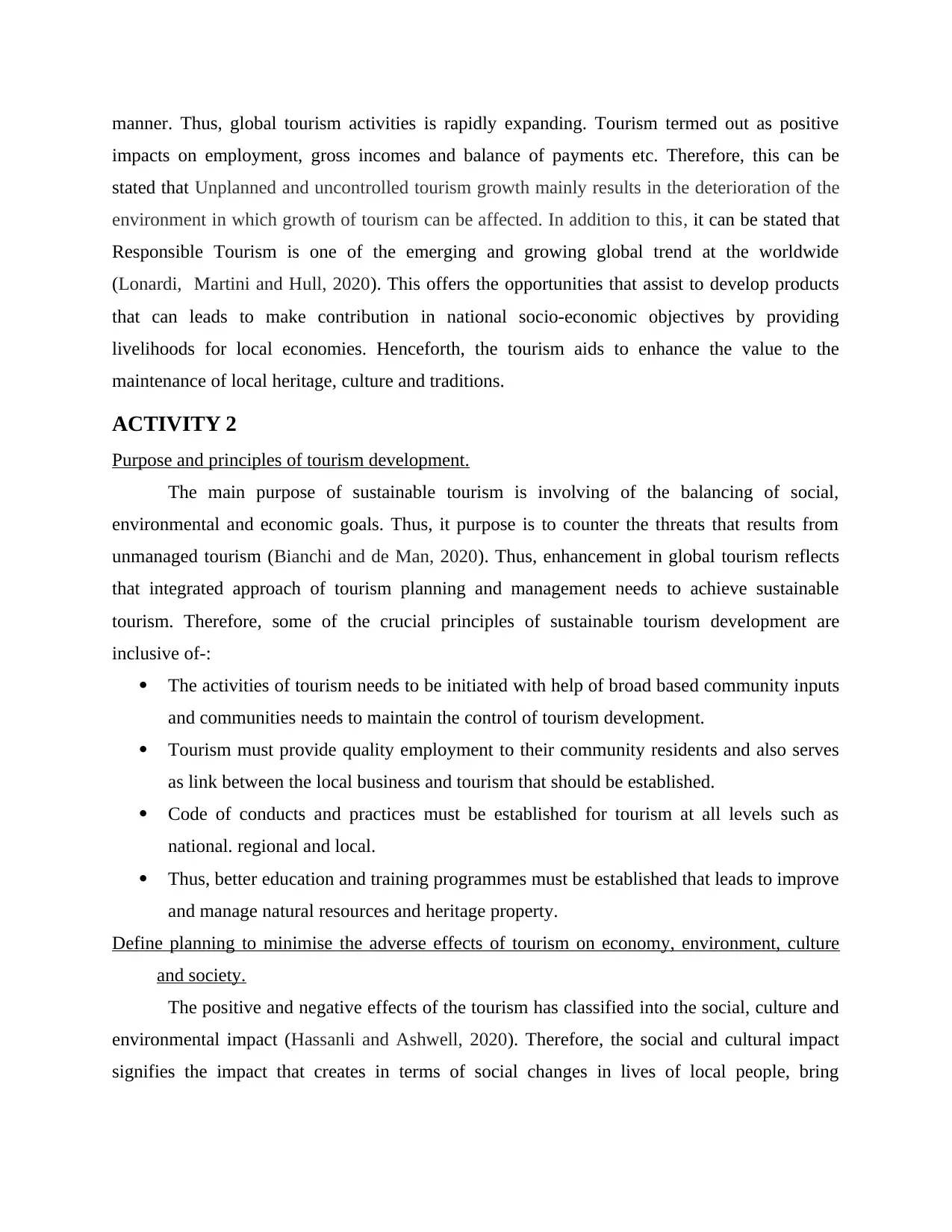
manner. Thus, global tourism activities is rapidly expanding. Tourism termed out as positive
impacts on employment, gross incomes and balance of payments etc. Therefore, this can be
stated that Unplanned and uncontrolled tourism growth mainly results in the deterioration of the
environment in which growth of tourism can be affected. In addition to this, it can be stated that
Responsible Tourism is one of the emerging and growing global trend at the worldwide
(Lonardi, Martini and Hull, 2020). This offers the opportunities that assist to develop products
that can leads to make contribution in national socio-economic objectives by providing
livelihoods for local economies. Henceforth, the tourism aids to enhance the value to the
maintenance of local heritage, culture and traditions.
ACTIVITY 2
Purpose and principles of tourism development.
The main purpose of sustainable tourism is involving of the balancing of social,
environmental and economic goals. Thus, it purpose is to counter the threats that results from
unmanaged tourism (Bianchi and de Man, 2020). Thus, enhancement in global tourism reflects
that integrated approach of tourism planning and management needs to achieve sustainable
tourism. Therefore, some of the crucial principles of sustainable tourism development are
inclusive of-:
The activities of tourism needs to be initiated with help of broad based community inputs
and communities needs to maintain the control of tourism development.
Tourism must provide quality employment to their community residents and also serves
as link between the local business and tourism that should be established.
Code of conducts and practices must be established for tourism at all levels such as
national. regional and local.
Thus, better education and training programmes must be established that leads to improve
and manage natural resources and heritage property.
Define planning to minimise the adverse effects of tourism on economy, environment, culture
and society.
The positive and negative effects of the tourism has classified into the social, culture and
environmental impact (Hassanli and Ashwell, 2020). Therefore, the social and cultural impact
signifies the impact that creates in terms of social changes in lives of local people, bring
impacts on employment, gross incomes and balance of payments etc. Therefore, this can be
stated that Unplanned and uncontrolled tourism growth mainly results in the deterioration of the
environment in which growth of tourism can be affected. In addition to this, it can be stated that
Responsible Tourism is one of the emerging and growing global trend at the worldwide
(Lonardi, Martini and Hull, 2020). This offers the opportunities that assist to develop products
that can leads to make contribution in national socio-economic objectives by providing
livelihoods for local economies. Henceforth, the tourism aids to enhance the value to the
maintenance of local heritage, culture and traditions.
ACTIVITY 2
Purpose and principles of tourism development.
The main purpose of sustainable tourism is involving of the balancing of social,
environmental and economic goals. Thus, it purpose is to counter the threats that results from
unmanaged tourism (Bianchi and de Man, 2020). Thus, enhancement in global tourism reflects
that integrated approach of tourism planning and management needs to achieve sustainable
tourism. Therefore, some of the crucial principles of sustainable tourism development are
inclusive of-:
The activities of tourism needs to be initiated with help of broad based community inputs
and communities needs to maintain the control of tourism development.
Tourism must provide quality employment to their community residents and also serves
as link between the local business and tourism that should be established.
Code of conducts and practices must be established for tourism at all levels such as
national. regional and local.
Thus, better education and training programmes must be established that leads to improve
and manage natural resources and heritage property.
Define planning to minimise the adverse effects of tourism on economy, environment, culture
and society.
The positive and negative effects of the tourism has classified into the social, culture and
environmental impact (Hassanli and Ashwell, 2020). Therefore, the social and cultural impact
signifies the impact that creates in terms of social changes in lives of local people, bring
Paraphrase This Document
Need a fresh take? Get an instant paraphrase of this document with our AI Paraphraser
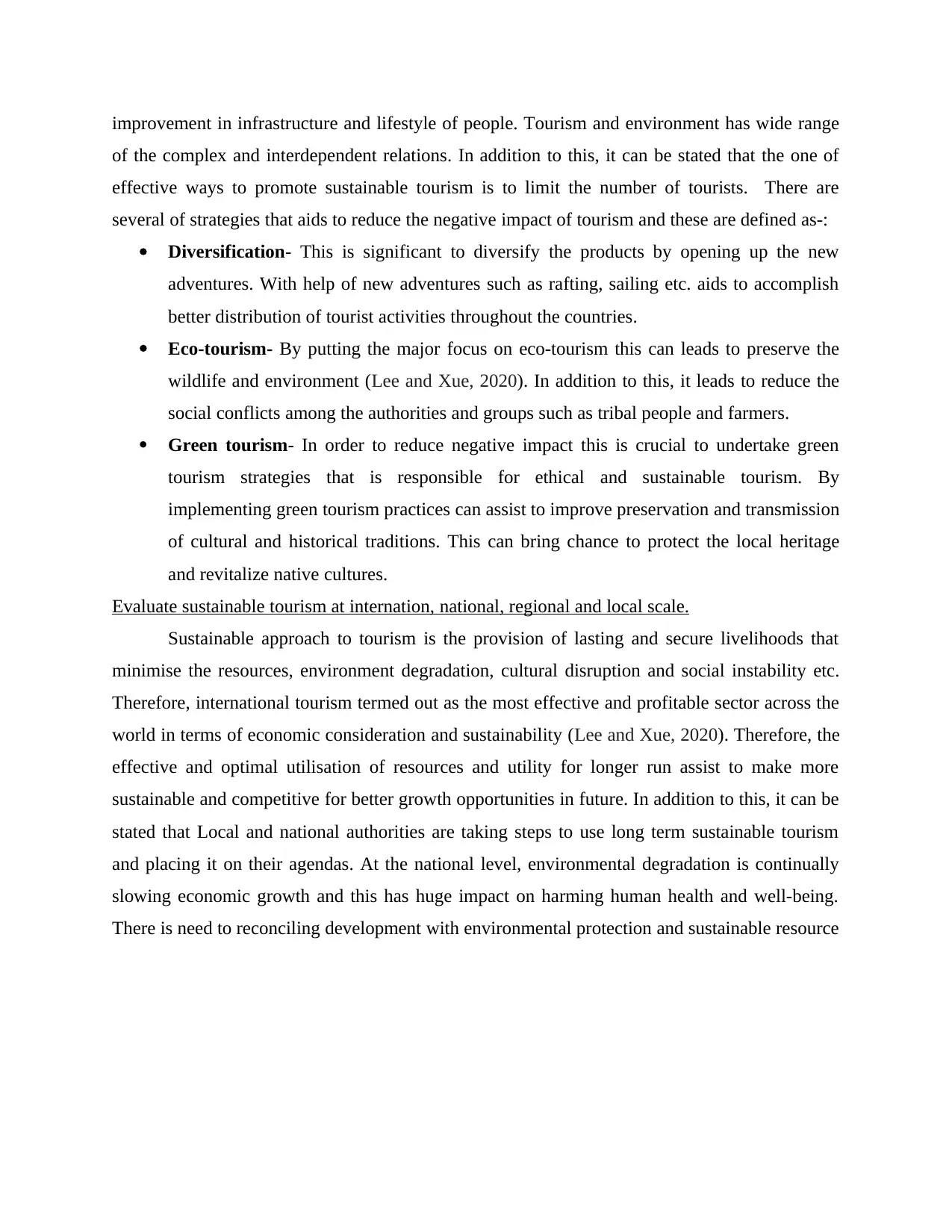
improvement in infrastructure and lifestyle of people. Tourism and environment has wide range
of the complex and interdependent relations. In addition to this, it can be stated that the one of
effective ways to promote sustainable tourism is to limit the number of tourists. There are
several of strategies that aids to reduce the negative impact of tourism and these are defined as-:
Diversification- This is significant to diversify the products by opening up the new
adventures. With help of new adventures such as rafting, sailing etc. aids to accomplish
better distribution of tourist activities throughout the countries.
Eco-tourism- By putting the major focus on eco-tourism this can leads to preserve the
wildlife and environment (Lee and Xue, 2020). In addition to this, it leads to reduce the
social conflicts among the authorities and groups such as tribal people and farmers.
Green tourism- In order to reduce negative impact this is crucial to undertake green
tourism strategies that is responsible for ethical and sustainable tourism. By
implementing green tourism practices can assist to improve preservation and transmission
of cultural and historical traditions. This can bring chance to protect the local heritage
and revitalize native cultures.
Evaluate sustainable tourism at internation, national, regional and local scale.
Sustainable approach to tourism is the provision of lasting and secure livelihoods that
minimise the resources, environment degradation, cultural disruption and social instability etc.
Therefore, international tourism termed out as the most effective and profitable sector across the
world in terms of economic consideration and sustainability (Lee and Xue, 2020). Therefore, the
effective and optimal utilisation of resources and utility for longer run assist to make more
sustainable and competitive for better growth opportunities in future. In addition to this, it can be
stated that Local and national authorities are taking steps to use long term sustainable tourism
and placing it on their agendas. At the national level, environmental degradation is continually
slowing economic growth and this has huge impact on harming human health and well-being.
There is need to reconciling development with environmental protection and sustainable resource
of the complex and interdependent relations. In addition to this, it can be stated that the one of
effective ways to promote sustainable tourism is to limit the number of tourists. There are
several of strategies that aids to reduce the negative impact of tourism and these are defined as-:
Diversification- This is significant to diversify the products by opening up the new
adventures. With help of new adventures such as rafting, sailing etc. aids to accomplish
better distribution of tourist activities throughout the countries.
Eco-tourism- By putting the major focus on eco-tourism this can leads to preserve the
wildlife and environment (Lee and Xue, 2020). In addition to this, it leads to reduce the
social conflicts among the authorities and groups such as tribal people and farmers.
Green tourism- In order to reduce negative impact this is crucial to undertake green
tourism strategies that is responsible for ethical and sustainable tourism. By
implementing green tourism practices can assist to improve preservation and transmission
of cultural and historical traditions. This can bring chance to protect the local heritage
and revitalize native cultures.
Evaluate sustainable tourism at internation, national, regional and local scale.
Sustainable approach to tourism is the provision of lasting and secure livelihoods that
minimise the resources, environment degradation, cultural disruption and social instability etc.
Therefore, international tourism termed out as the most effective and profitable sector across the
world in terms of economic consideration and sustainability (Lee and Xue, 2020). Therefore, the
effective and optimal utilisation of resources and utility for longer run assist to make more
sustainable and competitive for better growth opportunities in future. In addition to this, it can be
stated that Local and national authorities are taking steps to use long term sustainable tourism
and placing it on their agendas. At the national level, environmental degradation is continually
slowing economic growth and this has huge impact on harming human health and well-being.
There is need to reconciling development with environmental protection and sustainable resource
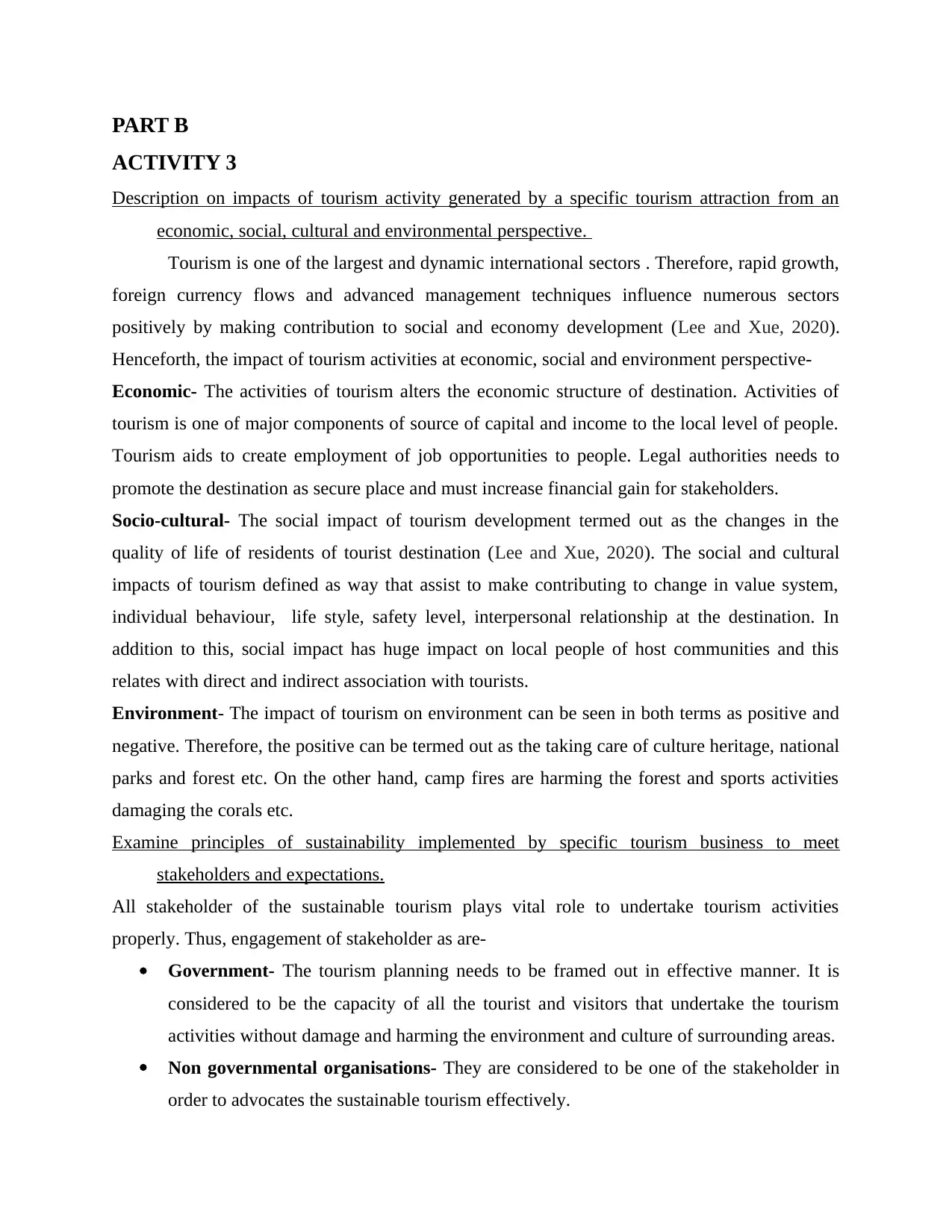
PART B
ACTIVITY 3
Description on impacts of tourism activity generated by a specific tourism attraction from an
economic, social, cultural and environmental perspective.
Tourism is one of the largest and dynamic international sectors . Therefore, rapid growth,
foreign currency flows and advanced management techniques influence numerous sectors
positively by making contribution to social and economy development (Lee and Xue, 2020).
Henceforth, the impact of tourism activities at economic, social and environment perspective-
Economic- The activities of tourism alters the economic structure of destination. Activities of
tourism is one of major components of source of capital and income to the local level of people.
Tourism aids to create employment of job opportunities to people. Legal authorities needs to
promote the destination as secure place and must increase financial gain for stakeholders.
Socio-cultural- The social impact of tourism development termed out as the changes in the
quality of life of residents of tourist destination (Lee and Xue, 2020). The social and cultural
impacts of tourism defined as way that assist to make contributing to change in value system,
individual behaviour, life style, safety level, interpersonal relationship at the destination. In
addition to this, social impact has huge impact on local people of host communities and this
relates with direct and indirect association with tourists.
Environment- The impact of tourism on environment can be seen in both terms as positive and
negative. Therefore, the positive can be termed out as the taking care of culture heritage, national
parks and forest etc. On the other hand, camp fires are harming the forest and sports activities
damaging the corals etc.
Examine principles of sustainability implemented by specific tourism business to meet
stakeholders and expectations.
All stakeholder of the sustainable tourism plays vital role to undertake tourism activities
properly. Thus, engagement of stakeholder as are-
Government- The tourism planning needs to be framed out in effective manner. It is
considered to be the capacity of all the tourist and visitors that undertake the tourism
activities without damage and harming the environment and culture of surrounding areas.
Non governmental organisations- They are considered to be one of the stakeholder in
order to advocates the sustainable tourism effectively.
ACTIVITY 3
Description on impacts of tourism activity generated by a specific tourism attraction from an
economic, social, cultural and environmental perspective.
Tourism is one of the largest and dynamic international sectors . Therefore, rapid growth,
foreign currency flows and advanced management techniques influence numerous sectors
positively by making contribution to social and economy development (Lee and Xue, 2020).
Henceforth, the impact of tourism activities at economic, social and environment perspective-
Economic- The activities of tourism alters the economic structure of destination. Activities of
tourism is one of major components of source of capital and income to the local level of people.
Tourism aids to create employment of job opportunities to people. Legal authorities needs to
promote the destination as secure place and must increase financial gain for stakeholders.
Socio-cultural- The social impact of tourism development termed out as the changes in the
quality of life of residents of tourist destination (Lee and Xue, 2020). The social and cultural
impacts of tourism defined as way that assist to make contributing to change in value system,
individual behaviour, life style, safety level, interpersonal relationship at the destination. In
addition to this, social impact has huge impact on local people of host communities and this
relates with direct and indirect association with tourists.
Environment- The impact of tourism on environment can be seen in both terms as positive and
negative. Therefore, the positive can be termed out as the taking care of culture heritage, national
parks and forest etc. On the other hand, camp fires are harming the forest and sports activities
damaging the corals etc.
Examine principles of sustainability implemented by specific tourism business to meet
stakeholders and expectations.
All stakeholder of the sustainable tourism plays vital role to undertake tourism activities
properly. Thus, engagement of stakeholder as are-
Government- The tourism planning needs to be framed out in effective manner. It is
considered to be the capacity of all the tourist and visitors that undertake the tourism
activities without damage and harming the environment and culture of surrounding areas.
Non governmental organisations- They are considered to be one of the stakeholder in
order to advocates the sustainable tourism effectively.
⊘ This is a preview!⊘
Do you want full access?
Subscribe today to unlock all pages.

Trusted by 1+ million students worldwide
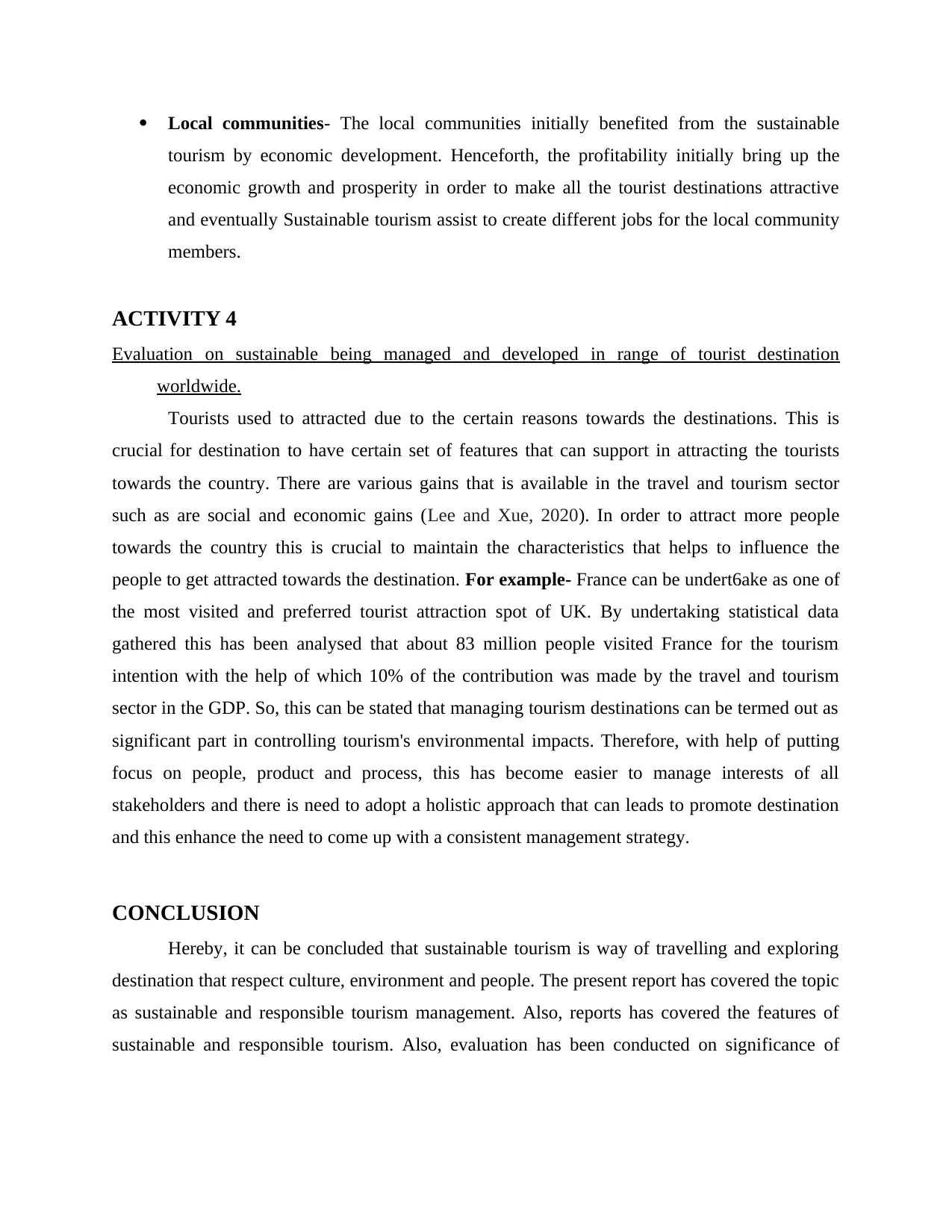
Local communities- The local communities initially benefited from the sustainable
tourism by economic development. Henceforth, the profitability initially bring up the
economic growth and prosperity in order to make all the tourist destinations attractive
and eventually Sustainable tourism assist to create different jobs for the local community
members.
ACTIVITY 4
Evaluation on sustainable being managed and developed in range of tourist destination
worldwide.
Tourists used to attracted due to the certain reasons towards the destinations. This is
crucial for destination to have certain set of features that can support in attracting the tourists
towards the country. There are various gains that is available in the travel and tourism sector
such as are social and economic gains (Lee and Xue, 2020). In order to attract more people
towards the country this is crucial to maintain the characteristics that helps to influence the
people to get attracted towards the destination. For example- France can be undert6ake as one of
the most visited and preferred tourist attraction spot of UK. By undertaking statistical data
gathered this has been analysed that about 83 million people visited France for the tourism
intention with the help of which 10% of the contribution was made by the travel and tourism
sector in the GDP. So, this can be stated that managing tourism destinations can be termed out as
significant part in controlling tourism's environmental impacts. Therefore, with help of putting
focus on people, product and process, this has become easier to manage interests of all
stakeholders and there is need to adopt a holistic approach that can leads to promote destination
and this enhance the need to come up with a consistent management strategy.
CONCLUSION
Hereby, it can be concluded that sustainable tourism is way of travelling and exploring
destination that respect culture, environment and people. The present report has covered the topic
as sustainable and responsible tourism management. Also, reports has covered the features of
sustainable and responsible tourism. Also, evaluation has been conducted on significance of
tourism by economic development. Henceforth, the profitability initially bring up the
economic growth and prosperity in order to make all the tourist destinations attractive
and eventually Sustainable tourism assist to create different jobs for the local community
members.
ACTIVITY 4
Evaluation on sustainable being managed and developed in range of tourist destination
worldwide.
Tourists used to attracted due to the certain reasons towards the destinations. This is
crucial for destination to have certain set of features that can support in attracting the tourists
towards the country. There are various gains that is available in the travel and tourism sector
such as are social and economic gains (Lee and Xue, 2020). In order to attract more people
towards the country this is crucial to maintain the characteristics that helps to influence the
people to get attracted towards the destination. For example- France can be undert6ake as one of
the most visited and preferred tourist attraction spot of UK. By undertaking statistical data
gathered this has been analysed that about 83 million people visited France for the tourism
intention with the help of which 10% of the contribution was made by the travel and tourism
sector in the GDP. So, this can be stated that managing tourism destinations can be termed out as
significant part in controlling tourism's environmental impacts. Therefore, with help of putting
focus on people, product and process, this has become easier to manage interests of all
stakeholders and there is need to adopt a holistic approach that can leads to promote destination
and this enhance the need to come up with a consistent management strategy.
CONCLUSION
Hereby, it can be concluded that sustainable tourism is way of travelling and exploring
destination that respect culture, environment and people. The present report has covered the topic
as sustainable and responsible tourism management. Also, reports has covered the features of
sustainable and responsible tourism. Also, evaluation has been conducted on significance of
Paraphrase This Document
Need a fresh take? Get an instant paraphrase of this document with our AI Paraphraser

tourism development planning for sustainability. Lastly, evaluation has been outlined that
defines how sustainable and responsible tourism has evolved in destination at worldwide.
defines how sustainable and responsible tourism has evolved in destination at worldwide.
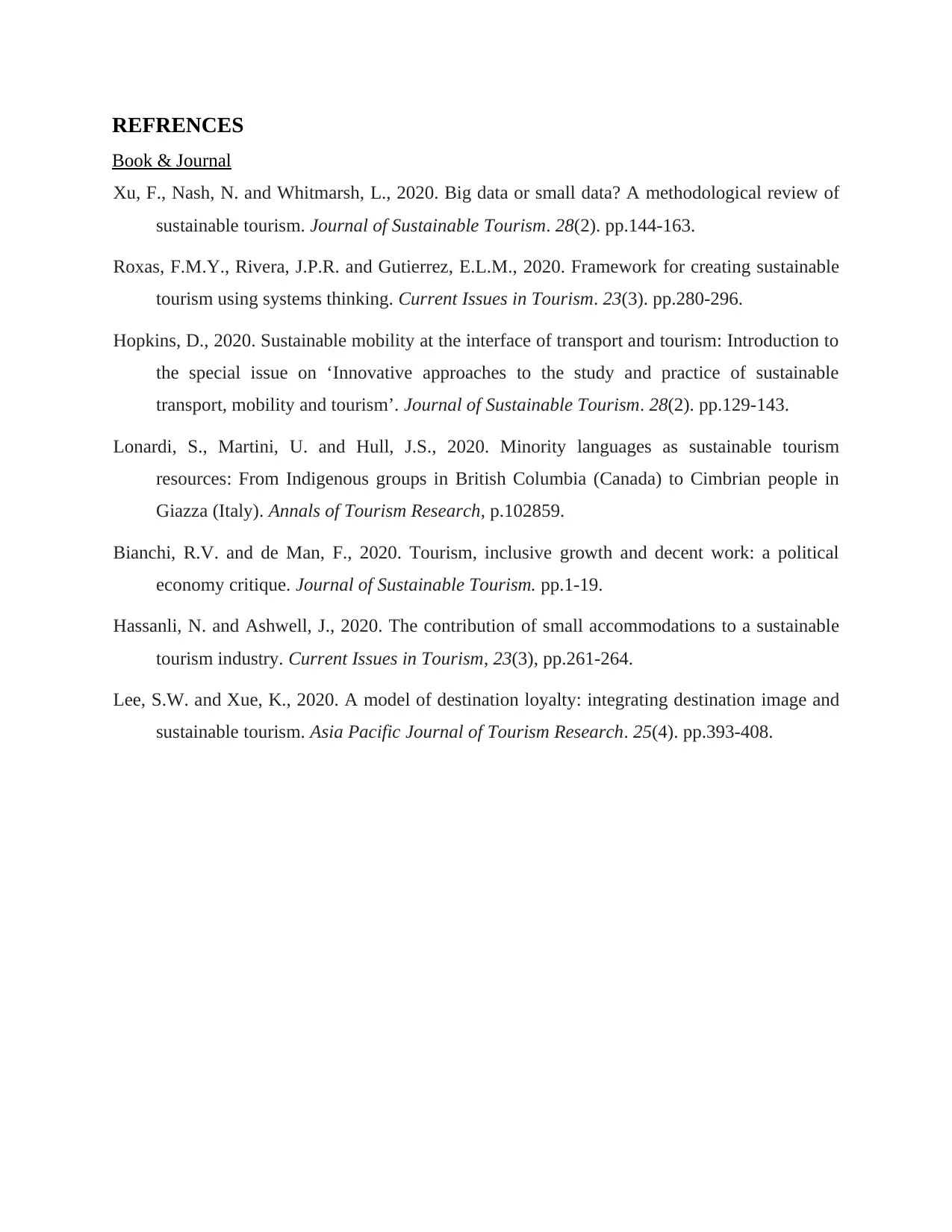
REFRENCES
Book & Journal
Xu, F., Nash, N. and Whitmarsh, L., 2020. Big data or small data? A methodological review of
sustainable tourism. Journal of Sustainable Tourism. 28(2). pp.144-163.
Roxas, F.M.Y., Rivera, J.P.R. and Gutierrez, E.L.M., 2020. Framework for creating sustainable
tourism using systems thinking. Current Issues in Tourism. 23(3). pp.280-296.
Hopkins, D., 2020. Sustainable mobility at the interface of transport and tourism: Introduction to
the special issue on ‘Innovative approaches to the study and practice of sustainable
transport, mobility and tourism’. Journal of Sustainable Tourism. 28(2). pp.129-143.
Lonardi, S., Martini, U. and Hull, J.S., 2020. Minority languages as sustainable tourism
resources: From Indigenous groups in British Columbia (Canada) to Cimbrian people in
Giazza (Italy). Annals of Tourism Research, p.102859.
Bianchi, R.V. and de Man, F., 2020. Tourism, inclusive growth and decent work: a political
economy critique. Journal of Sustainable Tourism. pp.1-19.
Hassanli, N. and Ashwell, J., 2020. The contribution of small accommodations to a sustainable
tourism industry. Current Issues in Tourism, 23(3), pp.261-264.
Lee, S.W. and Xue, K., 2020. A model of destination loyalty: integrating destination image and
sustainable tourism. Asia Pacific Journal of Tourism Research. 25(4). pp.393-408.
Book & Journal
Xu, F., Nash, N. and Whitmarsh, L., 2020. Big data or small data? A methodological review of
sustainable tourism. Journal of Sustainable Tourism. 28(2). pp.144-163.
Roxas, F.M.Y., Rivera, J.P.R. and Gutierrez, E.L.M., 2020. Framework for creating sustainable
tourism using systems thinking. Current Issues in Tourism. 23(3). pp.280-296.
Hopkins, D., 2020. Sustainable mobility at the interface of transport and tourism: Introduction to
the special issue on ‘Innovative approaches to the study and practice of sustainable
transport, mobility and tourism’. Journal of Sustainable Tourism. 28(2). pp.129-143.
Lonardi, S., Martini, U. and Hull, J.S., 2020. Minority languages as sustainable tourism
resources: From Indigenous groups in British Columbia (Canada) to Cimbrian people in
Giazza (Italy). Annals of Tourism Research, p.102859.
Bianchi, R.V. and de Man, F., 2020. Tourism, inclusive growth and decent work: a political
economy critique. Journal of Sustainable Tourism. pp.1-19.
Hassanli, N. and Ashwell, J., 2020. The contribution of small accommodations to a sustainable
tourism industry. Current Issues in Tourism, 23(3), pp.261-264.
Lee, S.W. and Xue, K., 2020. A model of destination loyalty: integrating destination image and
sustainable tourism. Asia Pacific Journal of Tourism Research. 25(4). pp.393-408.
⊘ This is a preview!⊘
Do you want full access?
Subscribe today to unlock all pages.

Trusted by 1+ million students worldwide
1 out of 9
Related Documents
Your All-in-One AI-Powered Toolkit for Academic Success.
+13062052269
info@desklib.com
Available 24*7 on WhatsApp / Email
![[object Object]](/_next/static/media/star-bottom.7253800d.svg)
Unlock your academic potential
Copyright © 2020–2026 A2Z Services. All Rights Reserved. Developed and managed by ZUCOL.


![Sustainable and Responsible Tourism Management Report - [Course Name]](/_next/image/?url=https%3A%2F%2Fdesklib.com%2Fmedia%2Fimages%2Ftt%2F97543c1e789843e897460d59424ee454.jpg&w=256&q=75)


